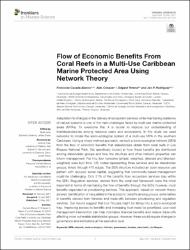Mostrar el registro sencillo del ítem
Flow of economic benefits from coral reefs in a multi-use Caribbean marine protected area using network theory
| Licencia | Creative Commons Attribution License (CC BY). The use, distribution or reproduction in other forums is permitted, provided the original author(s) and the copyright owner(s) are credited and that the original publication in this journal is cited, in accordance with accepted academic practice. No use, distribution or reproduction is permitted which does not comply with these terms. | es |
| Autor | Cavada-Blanco, Françoise | |
| Autor | Cróquer, Aldo | |
| Autor | Yerena, Edgar | |
| Autor | Rodríguez, Jon P. | |
| Fecha de admisión | 2021-11-11T19:55:43Z | |
| Fecha disponible | 2021-11-11T19:55:43Z | |
| Año | 2021 | |
| Citación | Cavada-Blanco, F., Cróquer, A., Yerena, E. y Rodríguez, J. P. (2021). Flow of economic benefits from coral reefs in a multi-use Caribbean marine protected area using network theory. Frontiers in Marine Science, 8, 671024. Disponible en: https://doi.org/10.3389/fmars.2021.671024 | es |
| URI | https://bvearmb.do/handle/123456789/157 | |
| Sinopsis | Adaptation to changes in the delivery of ecosystem services while maintaining resilience of natural systems is one of the main challenges faced by multi-use marine protected areas (MPAs). To overcome this, it is crucial to improve our understanding of interdependencies among resource users and ecosystems. In this study we used networks to model the socio-ecological system of a multi-use MPA in the southern Caribbean. Using a mixed-method approach, we built a socio ecological network (SEN) from the flow of economic benefits that stakeholders obtain from coral reefs in Los Roques National Park. We specifically looked at how these benefits are distributed among stakeholder groups and how the structure and other network properties can inform management. For this, four networks (simple, weighted, directed and directed-weighted) were built from 125 nodes representing three services and six stakeholder groups, linked through 475 edges. The SEN structure indicated an open resource use pattern with reduced social capital, suggesting that community-based management could be challenging. Only 31% of the benefits from ecosystem services stay within the SEN. Regulation services, derived from the coral reef framework were the most important in terms of maintaining the flow of benefits through the SEN; however, most benefits depended on provisioning services. This approach, based on network theory allowed identification of inequalities in the access to benefits among groups, externalities in benefits derived from fisheries and trade-offs between provisioning and regulation services. Our results suggest that Los Roques might be falling into a socio-ecological trap. Improving access to benefits and increasing trust need be prioritized. Low-cost management intervention can help internalize financial benefits and reduce trade-offs affecting more vulnerable stakeholder groups. However, these would require changes in governance and institutions at the executive level. | es |
| Idioma | English | es |
| Publicado | Frontiers in Marine Science [2296-7745], 8, 671024 | es |
| Derechos | © 2021 Cavada-Blanco, Cróquer, Yerena and Rodríguez. | es |
| URI de derechos | http://creativecommons.org/licenses/by/4.0/ | es |
| Materia | Áreas protegidas - Santuarios marinos | es |
| Materia | Gestión ambiental - Recursos | es |
| Materia | Sistemas socioecológicos | es |
| Materia | Hábitats y especies | |
| Título | Flow of economic benefits from coral reefs in a multi-use Caribbean marine protected area using network theory | es |
| dc.identifier.doi | 10.3389/fmars.2021.671024 | |
| Tipo de material | Article | es |
| Tipo de contenido | Scientific research | es |
| Acceso | Open | es |
| Audiencia | Technicians, professionals and scientists | es |
Ficheros en el ítem
Este ítem aparece en la(s) siguiente(s) colección(es)
-
Investigación ambiental [1196]
La consulta y descarga de este documento están sujetas a esta licencia: Creative Commons Attribution License (CC BY). The use, distribution or reproduction in other forums is permitted, provided the original author(s) and the copyright owner(s) are credited and that the original publication in this journal is cited, in accordance with accepted academic practice. No use, distribution or reproduction is permitted which does not comply with these terms.
© 2021 Cavada-Blanco, Cróquer, Yerena and Rodríguez.
© 2021 Cavada-Blanco, Cróquer, Yerena and Rodríguez.


